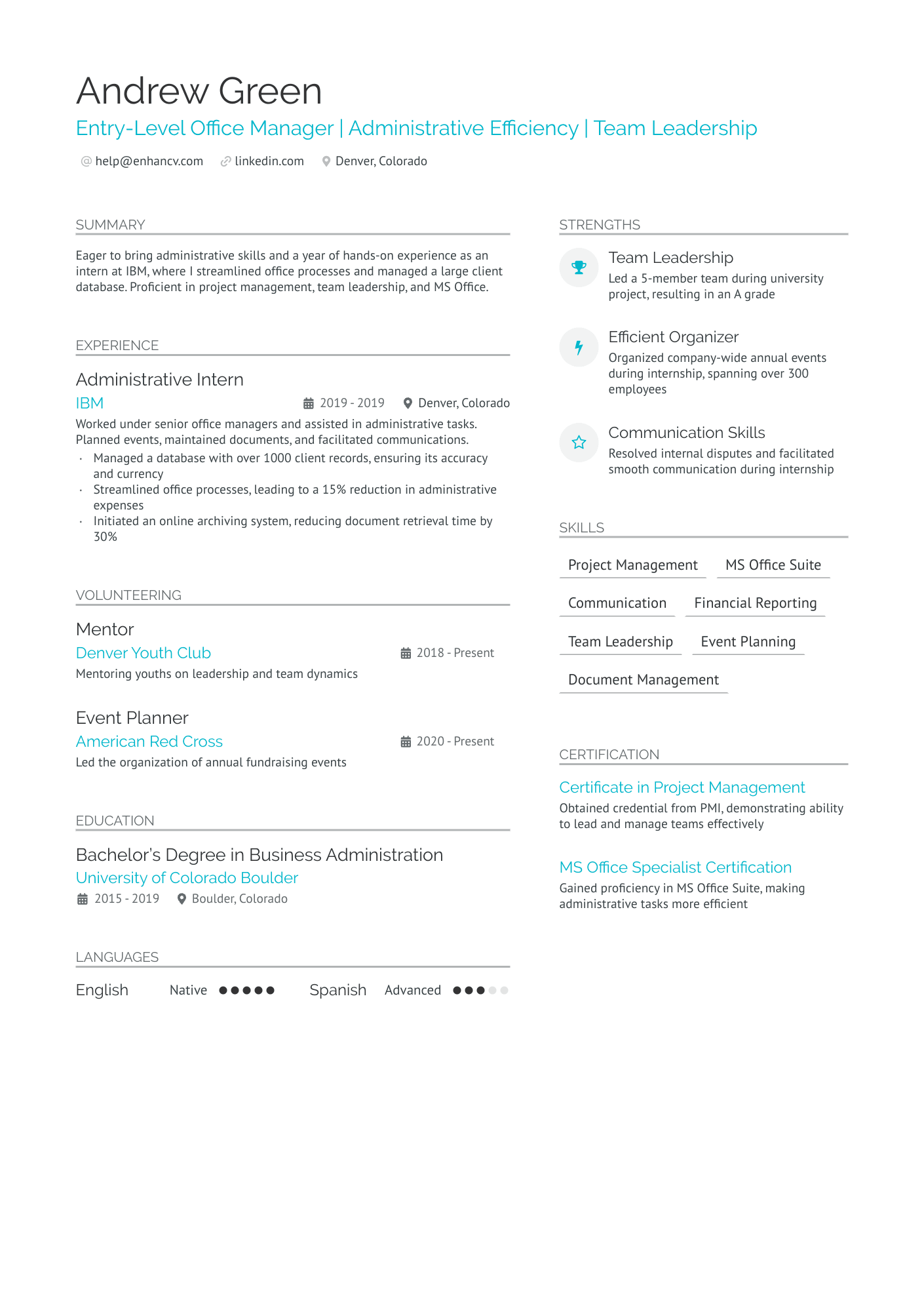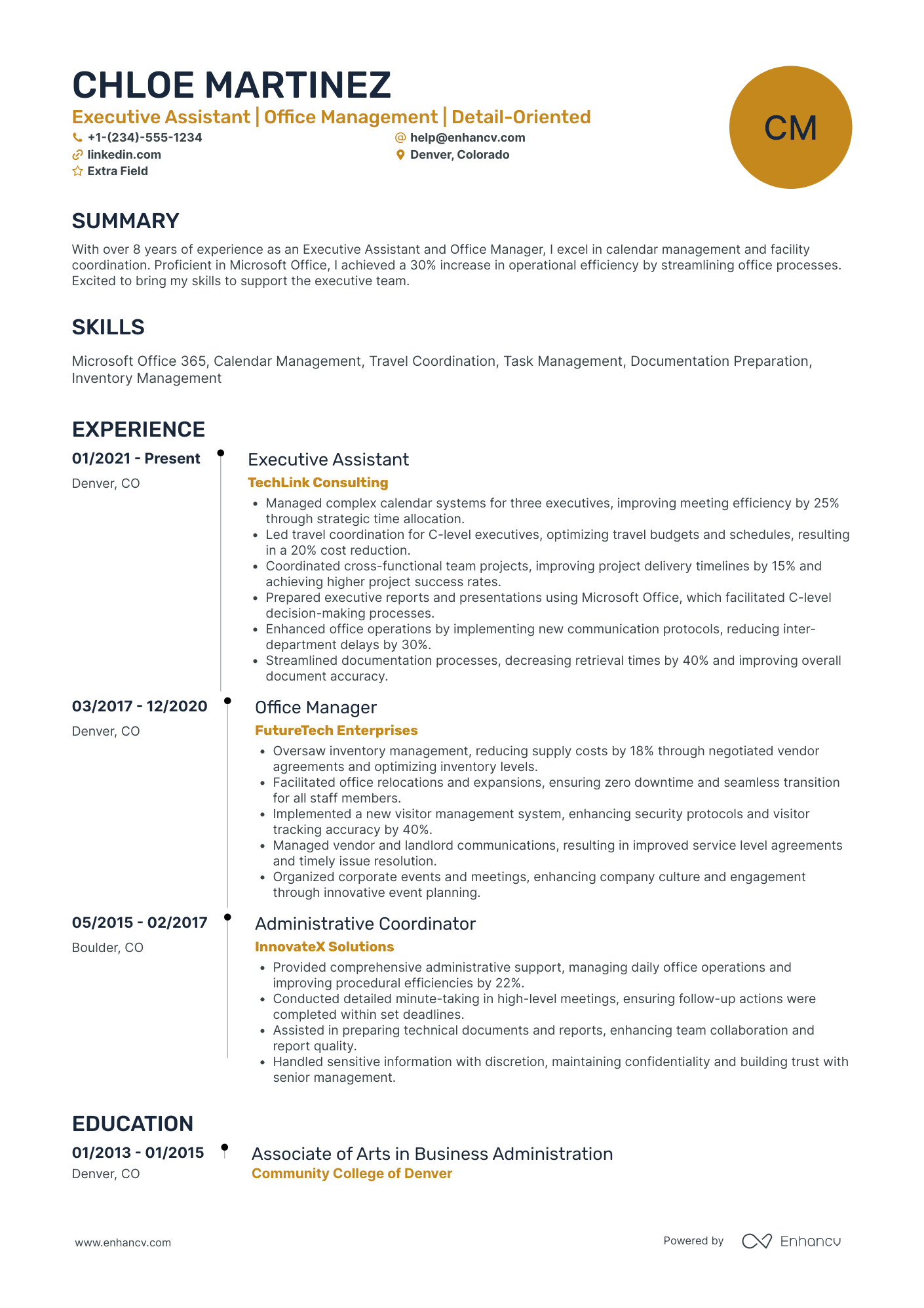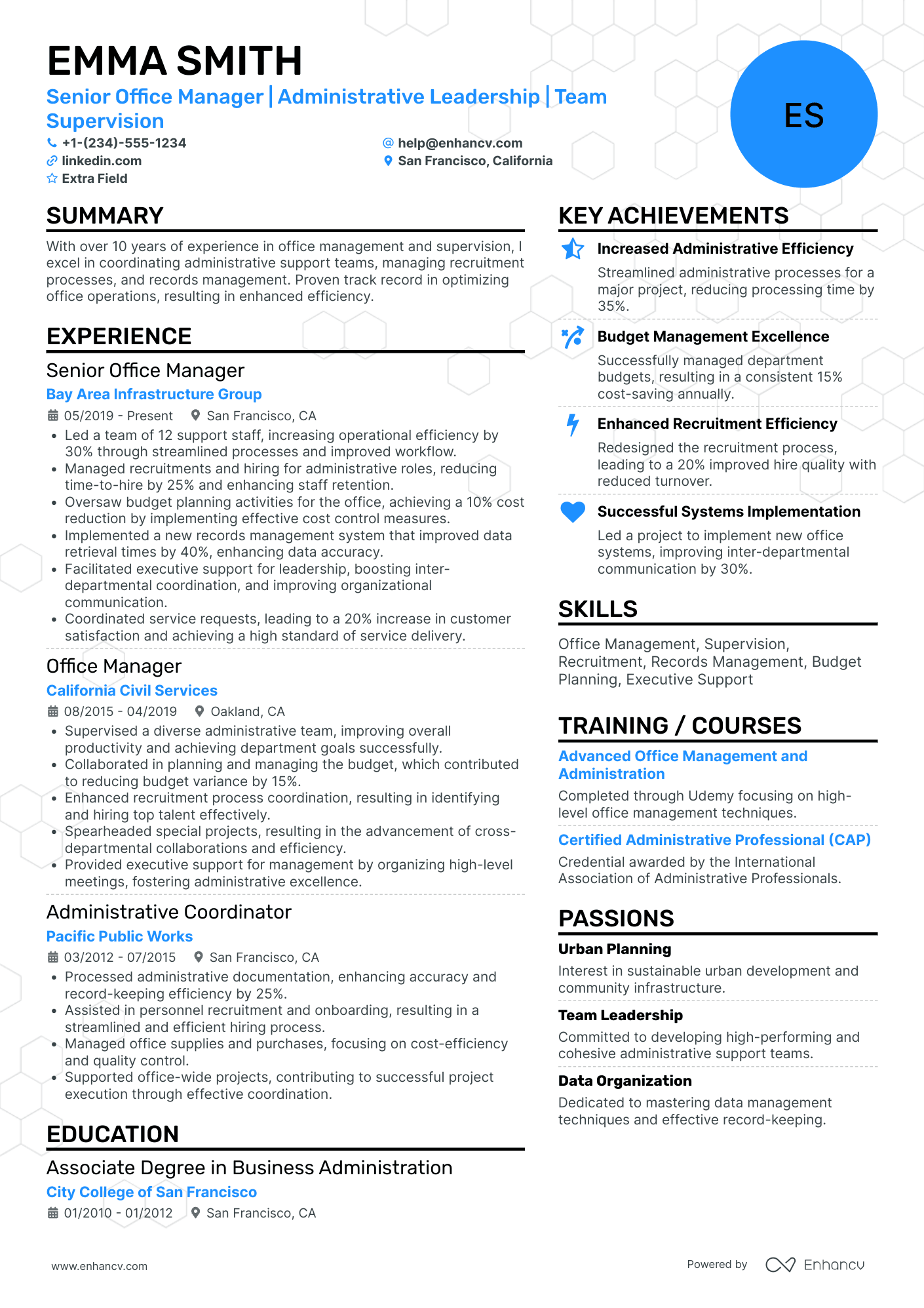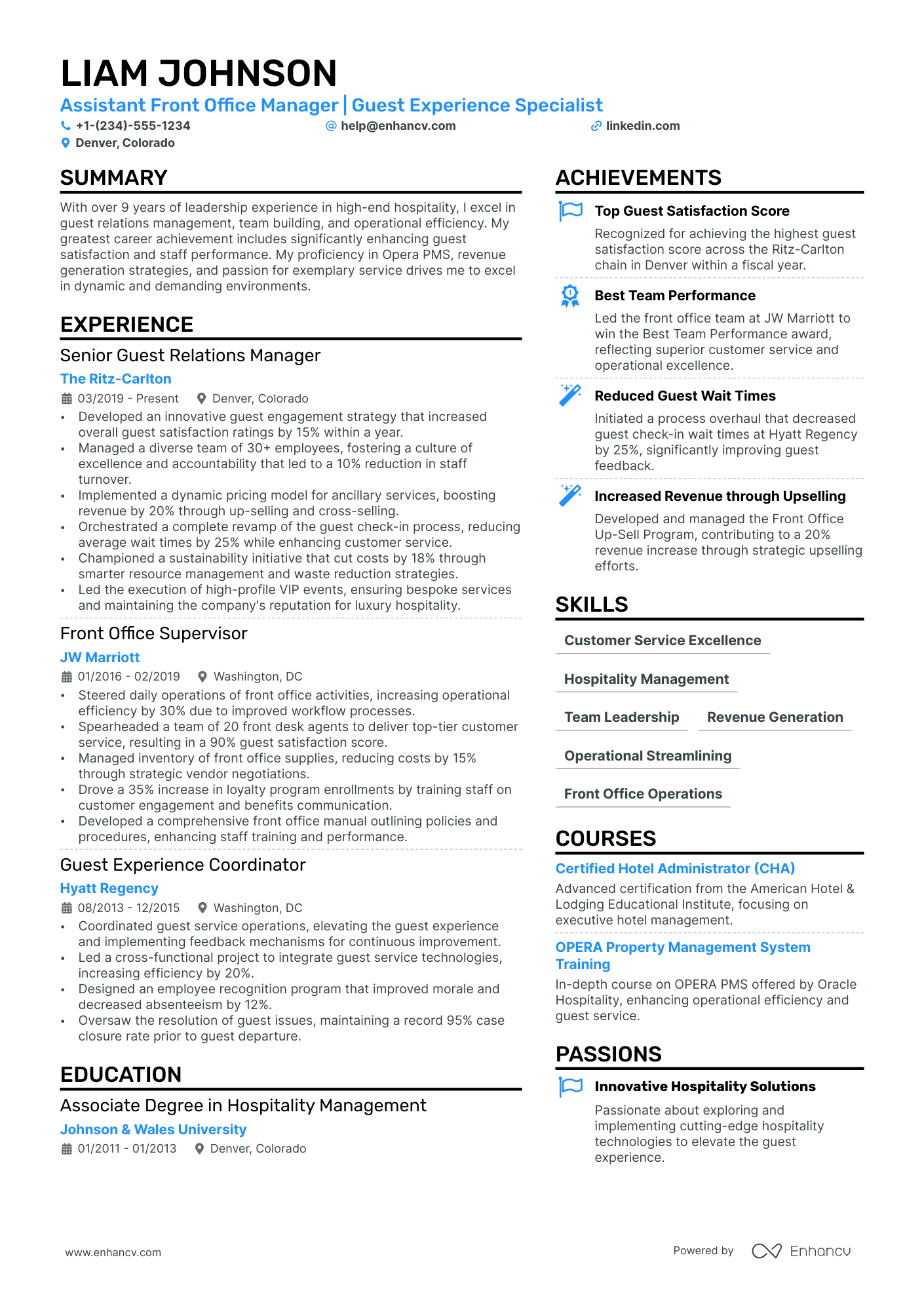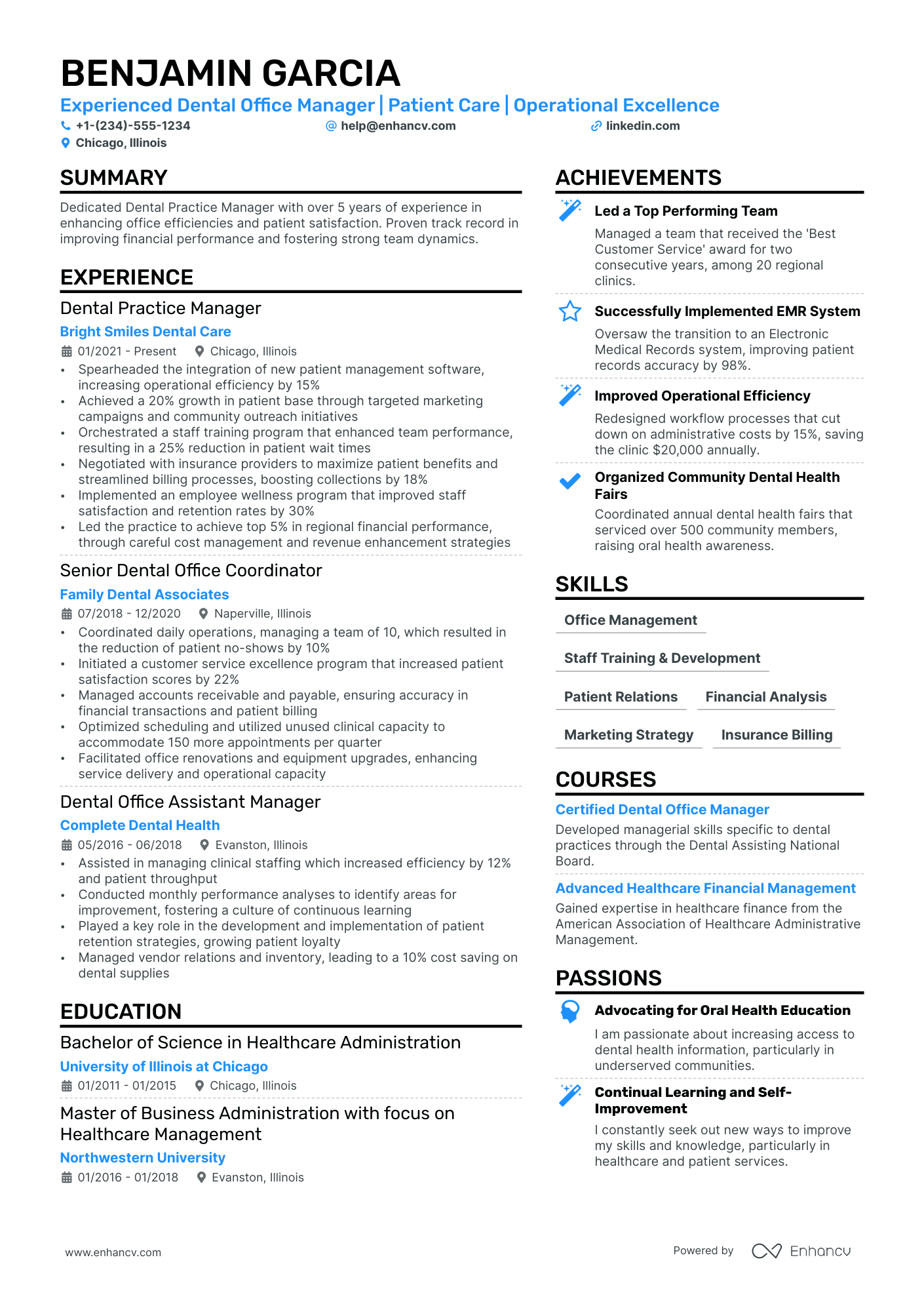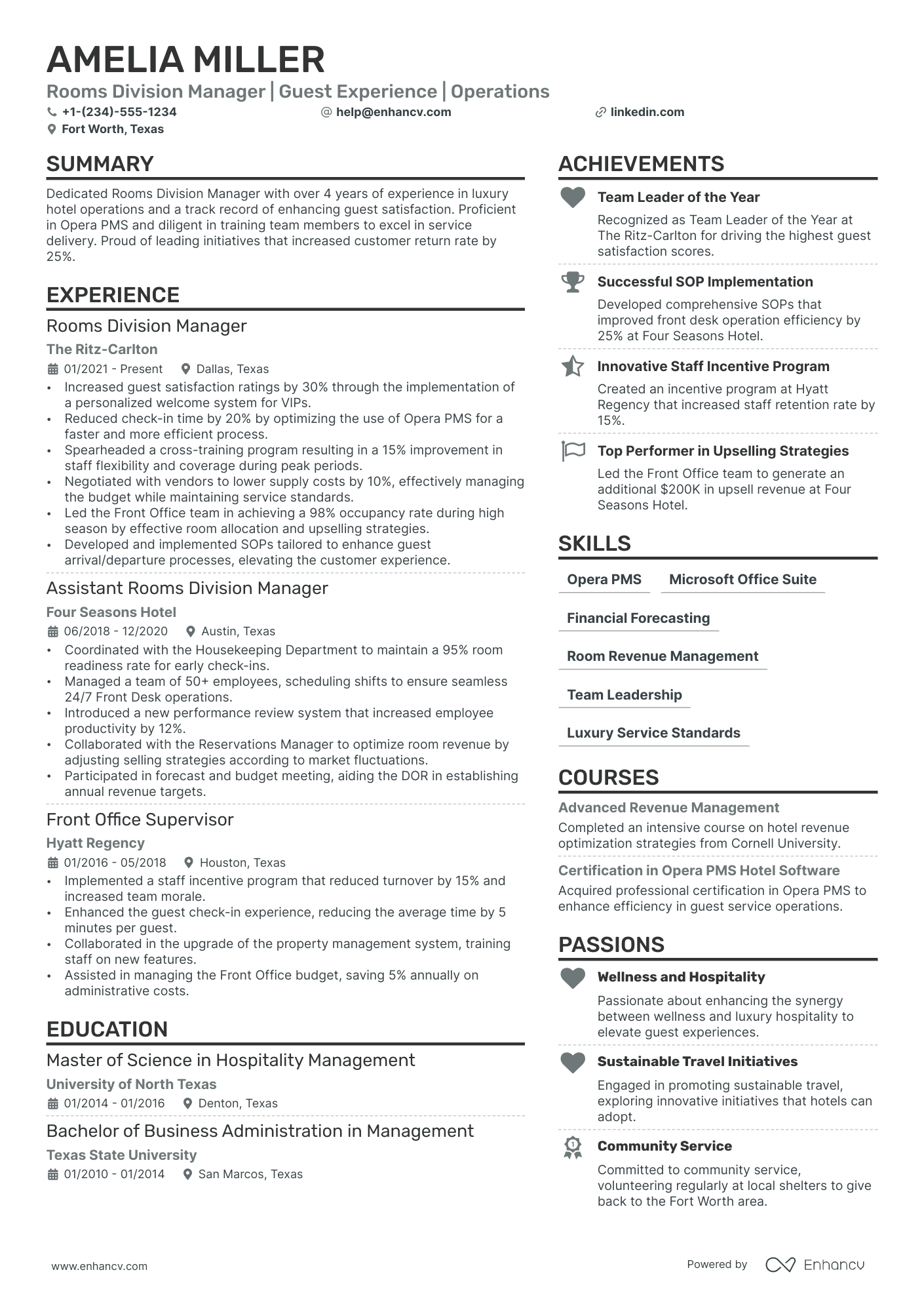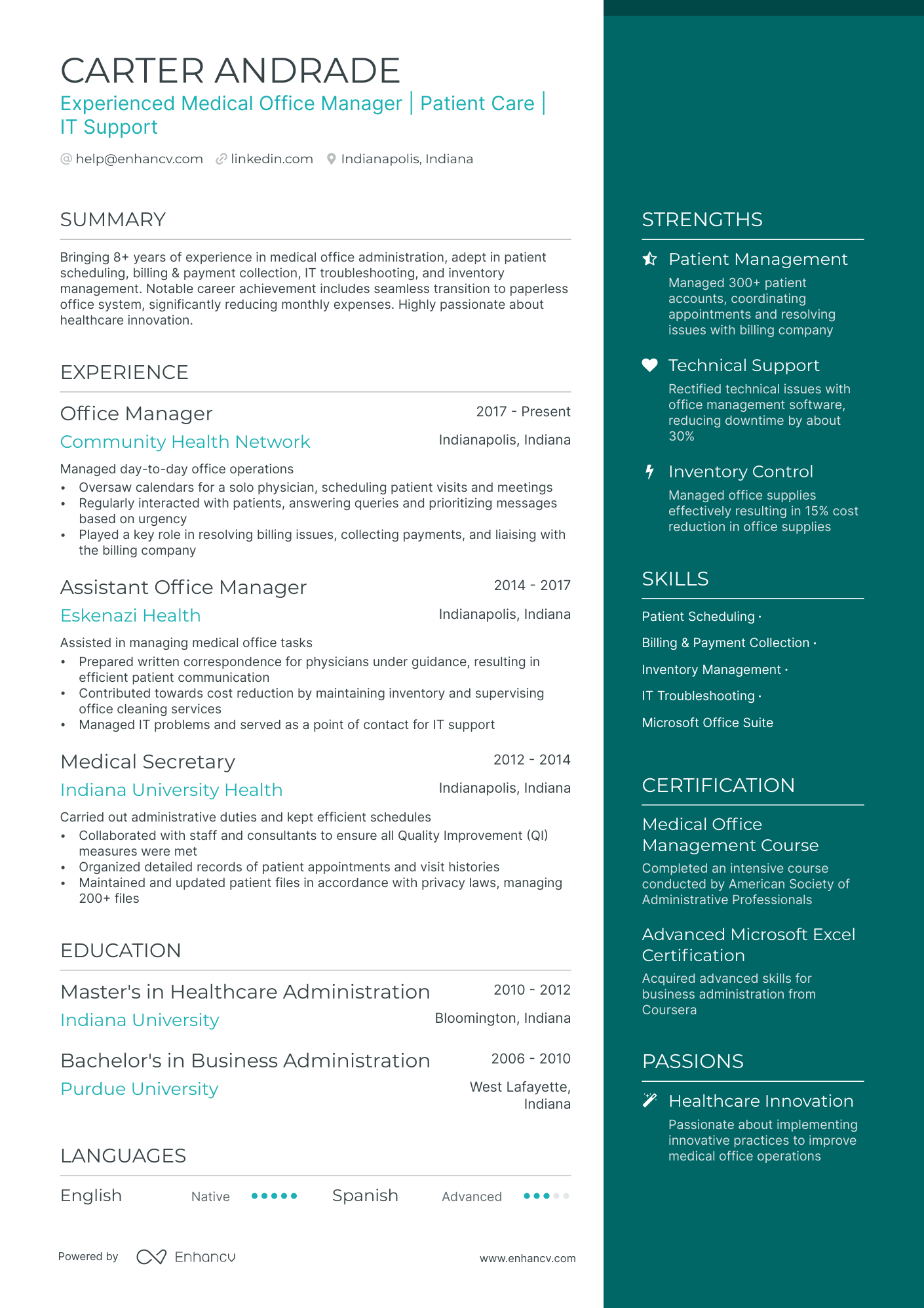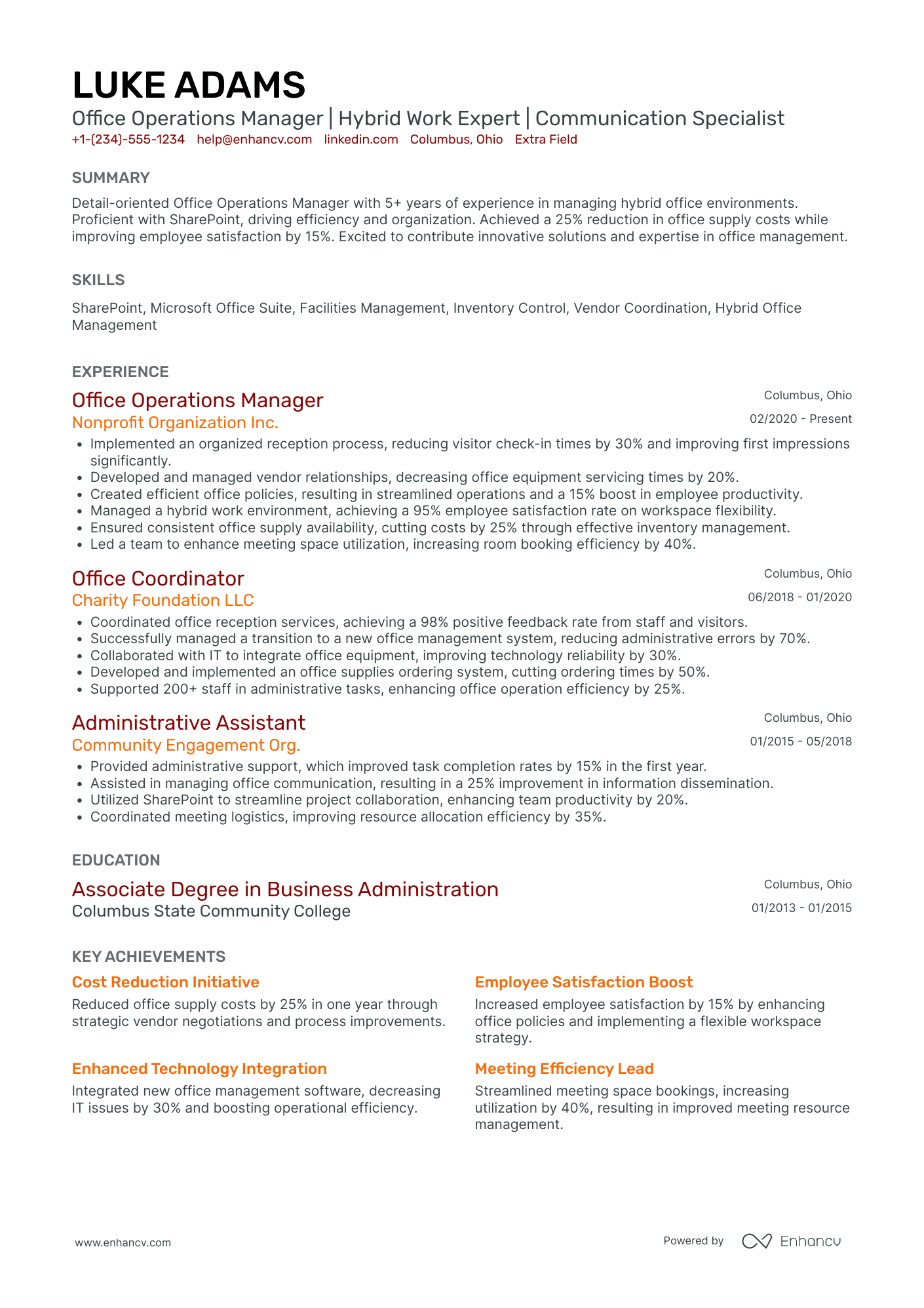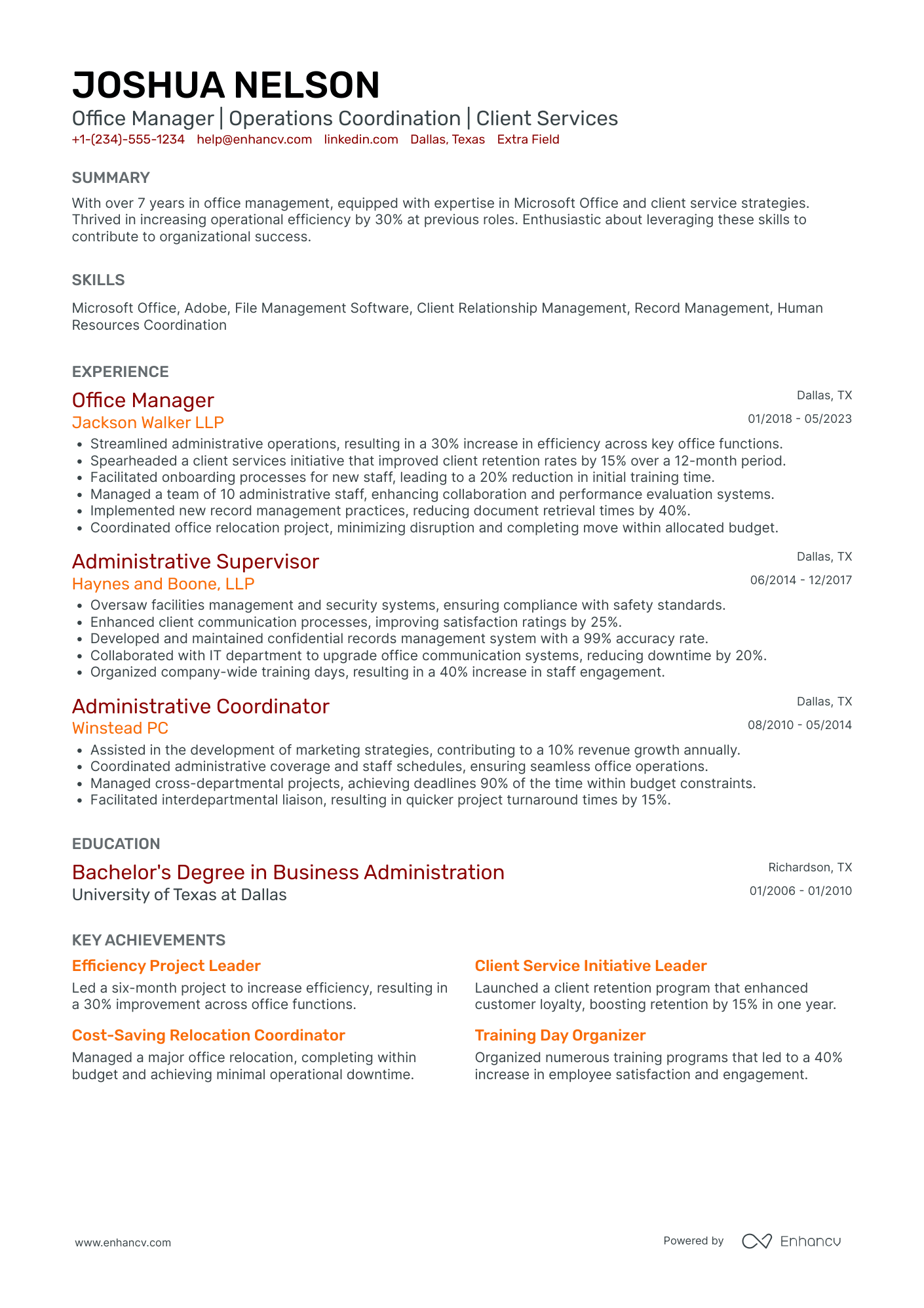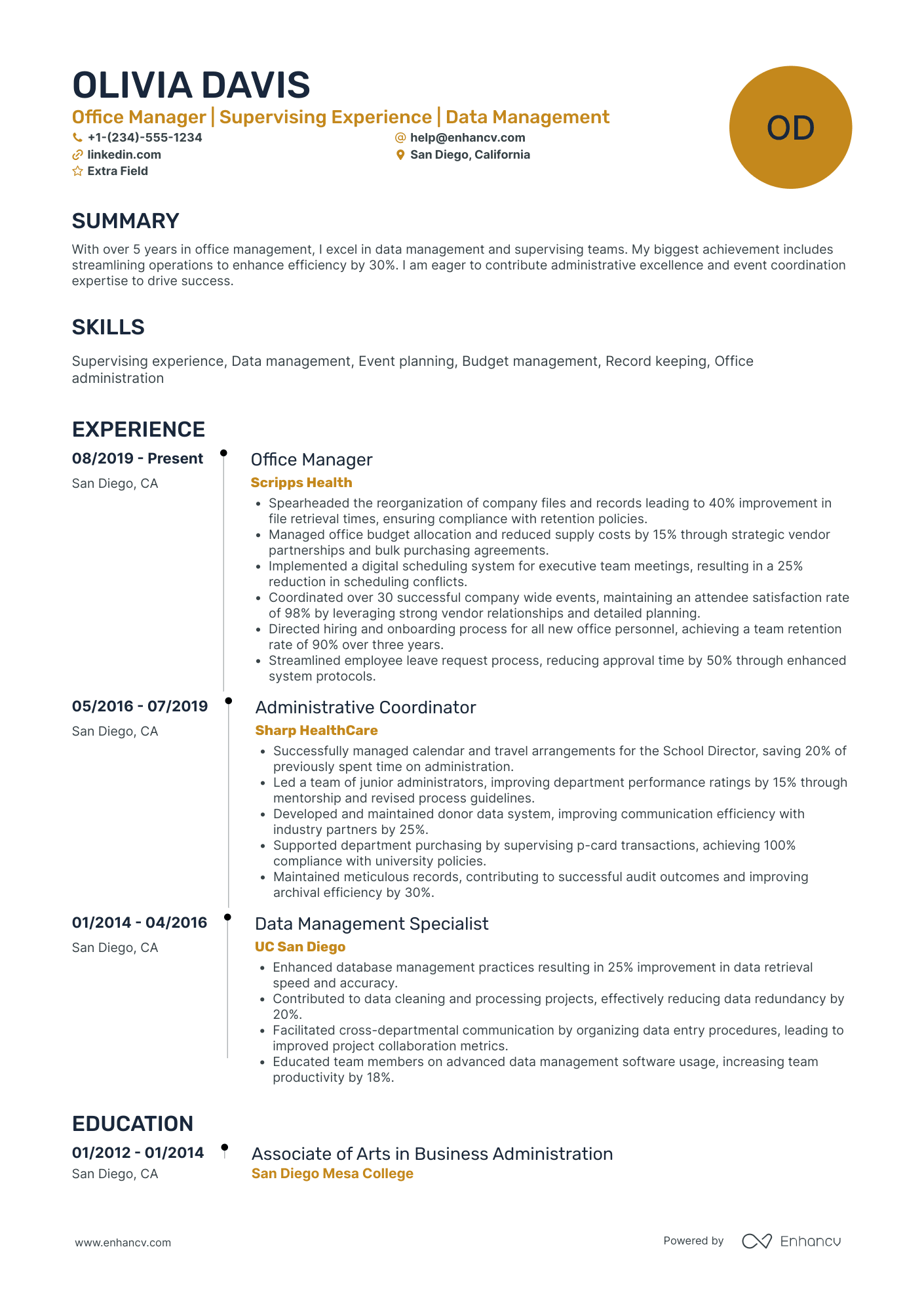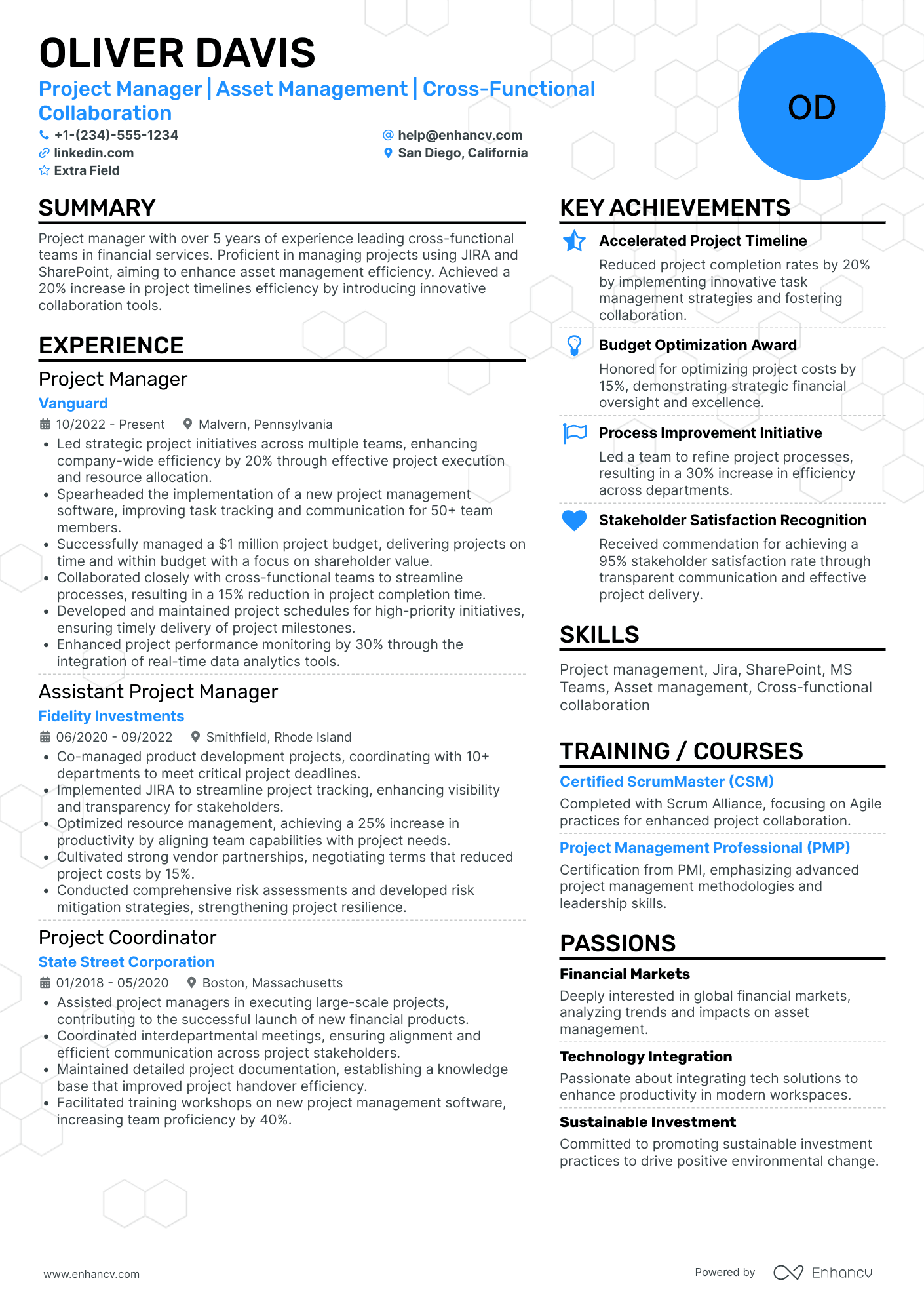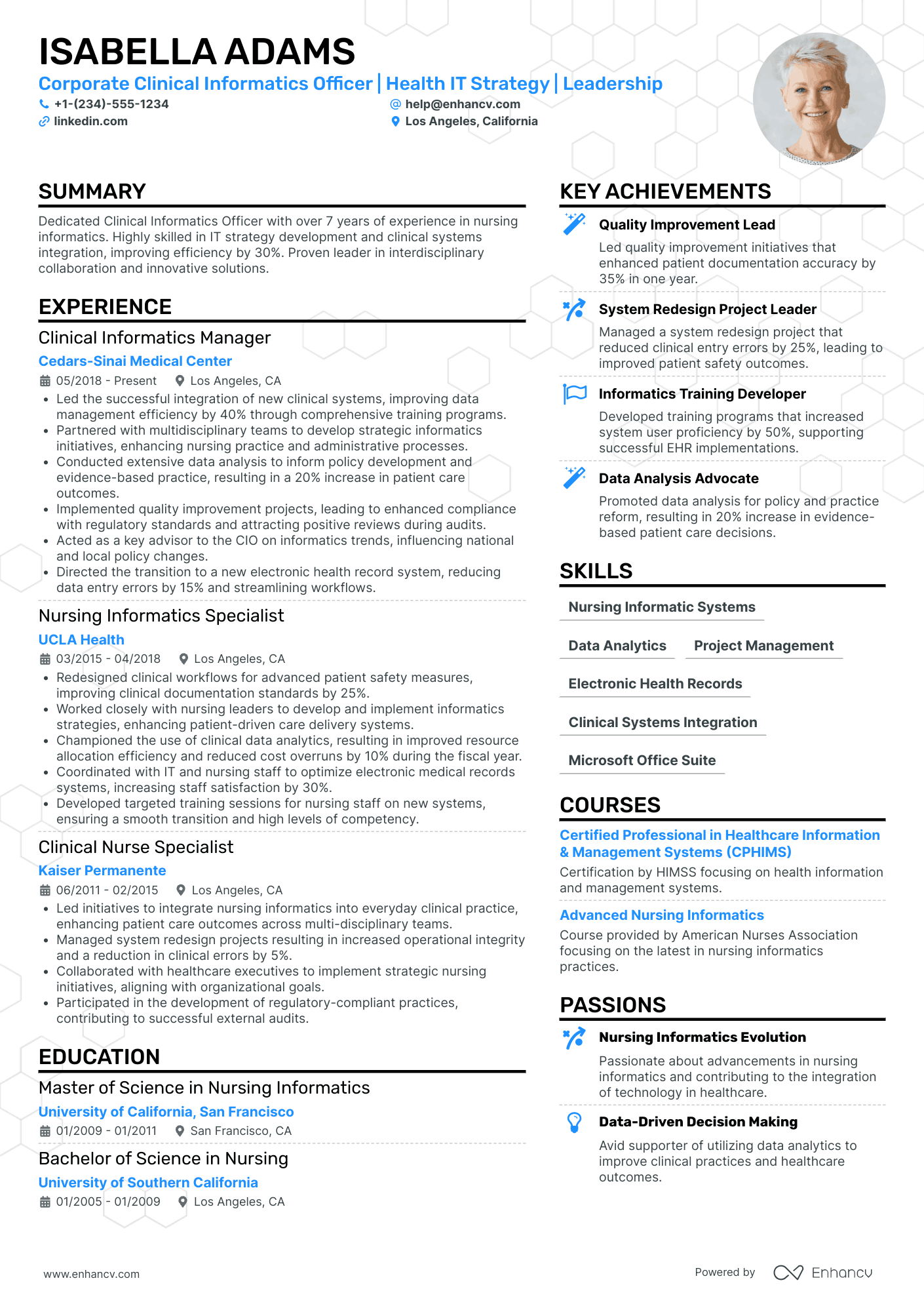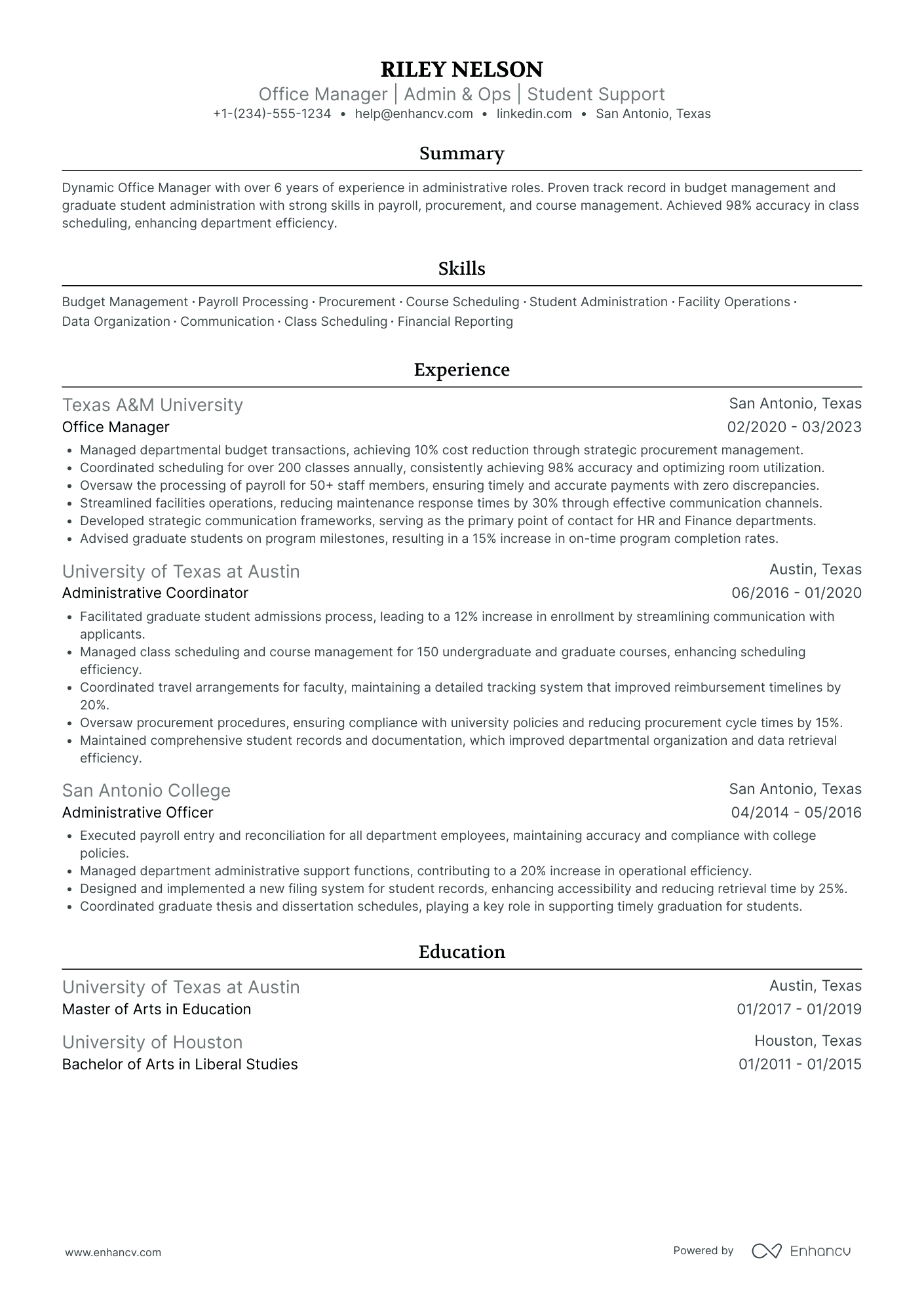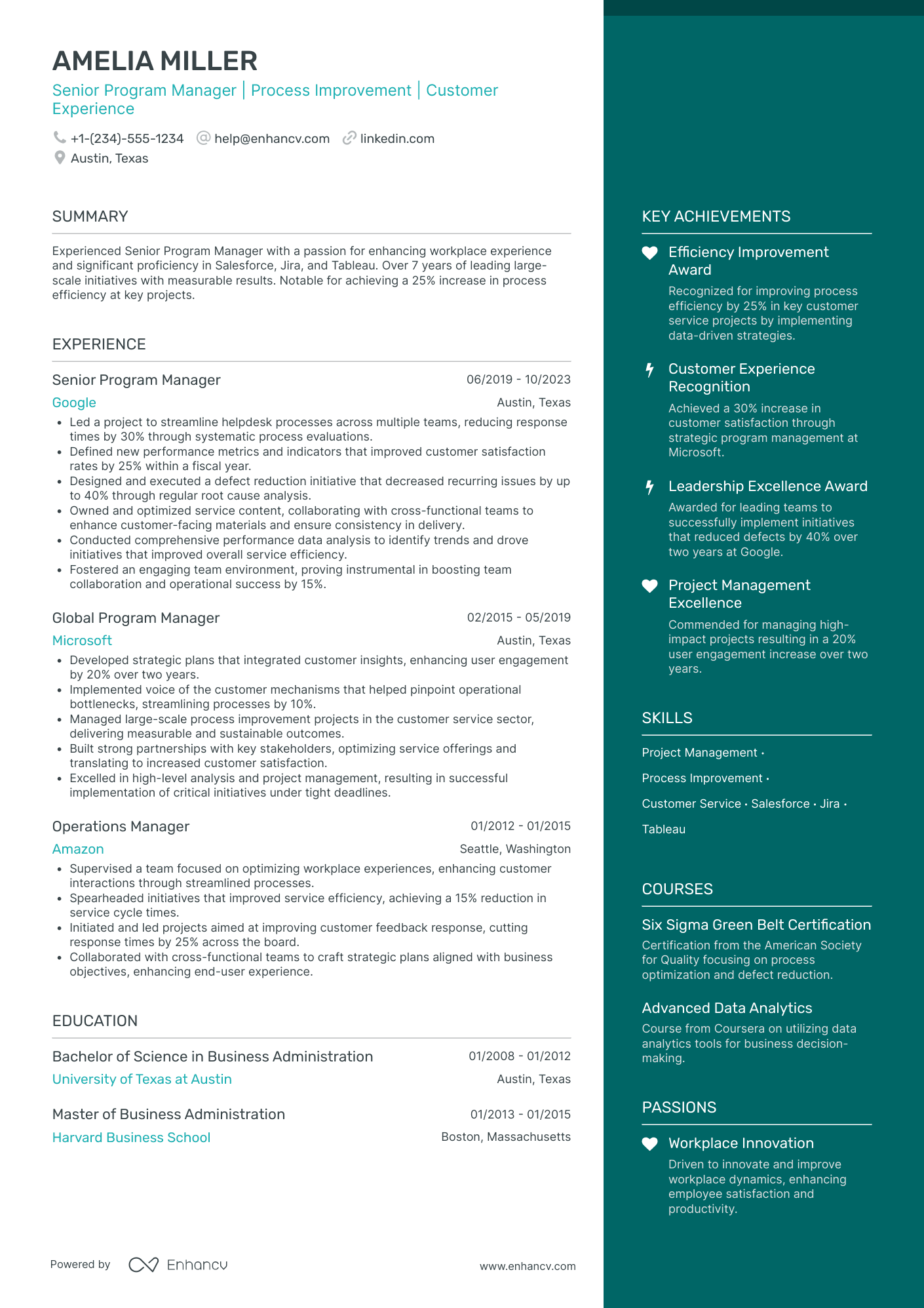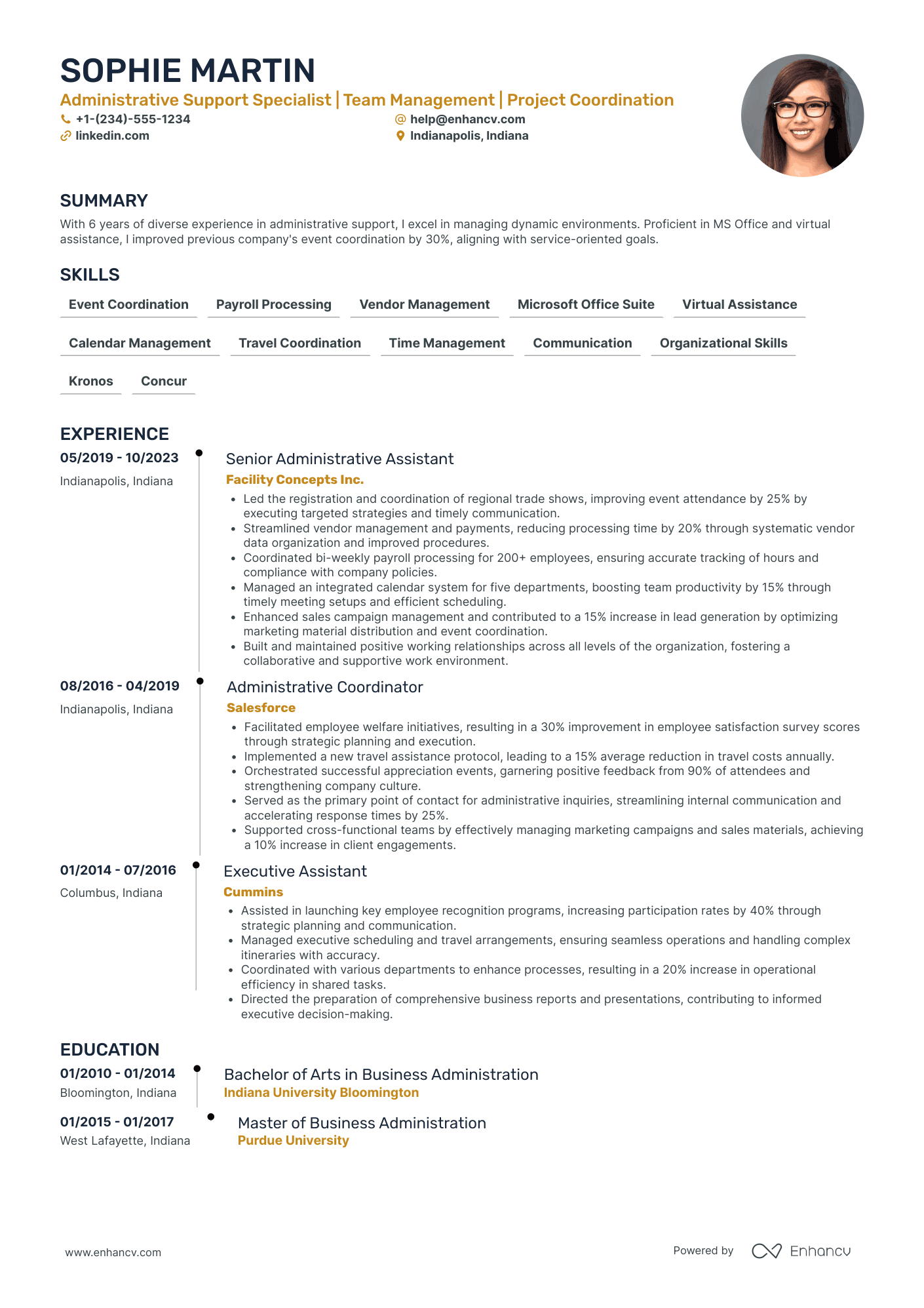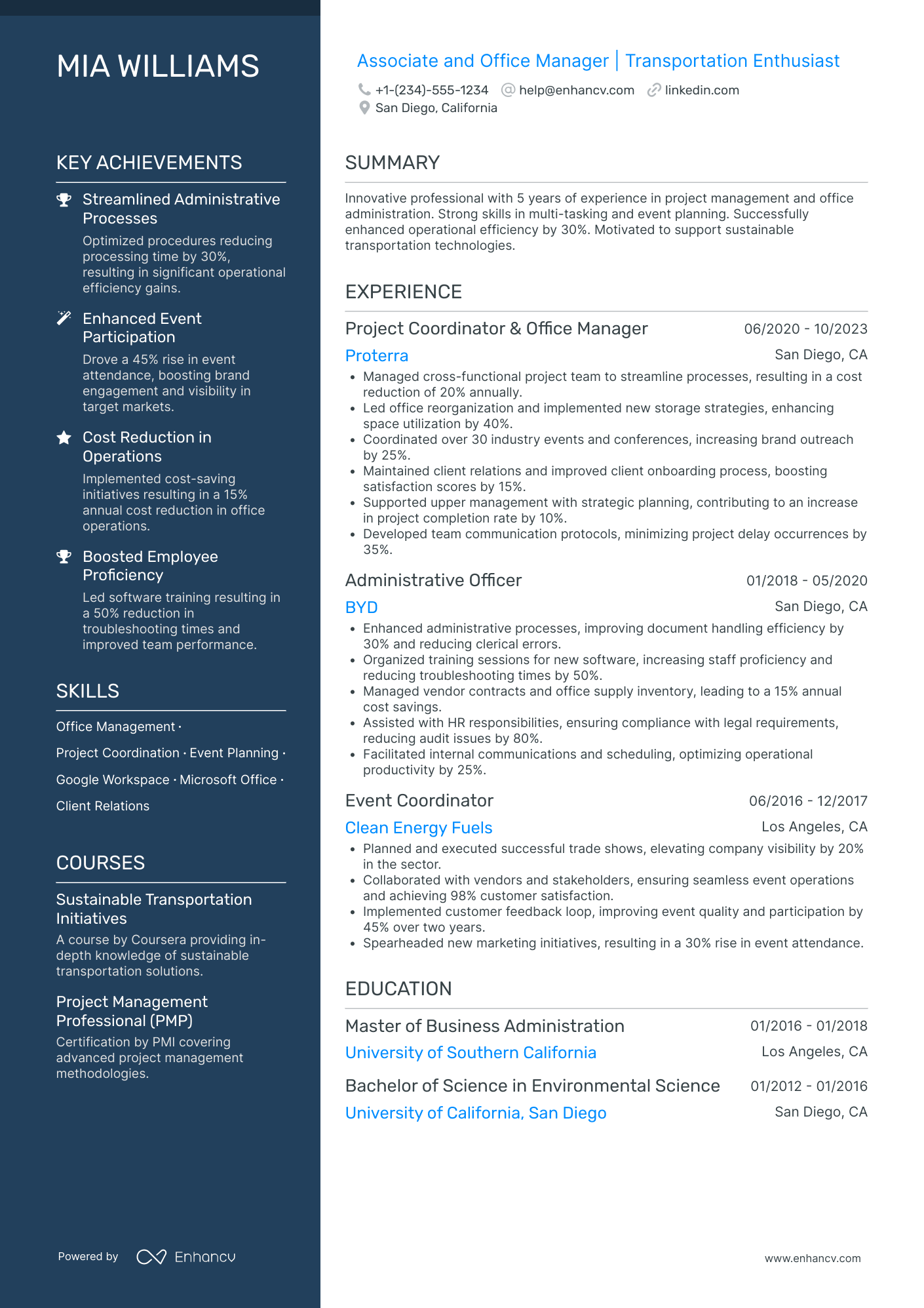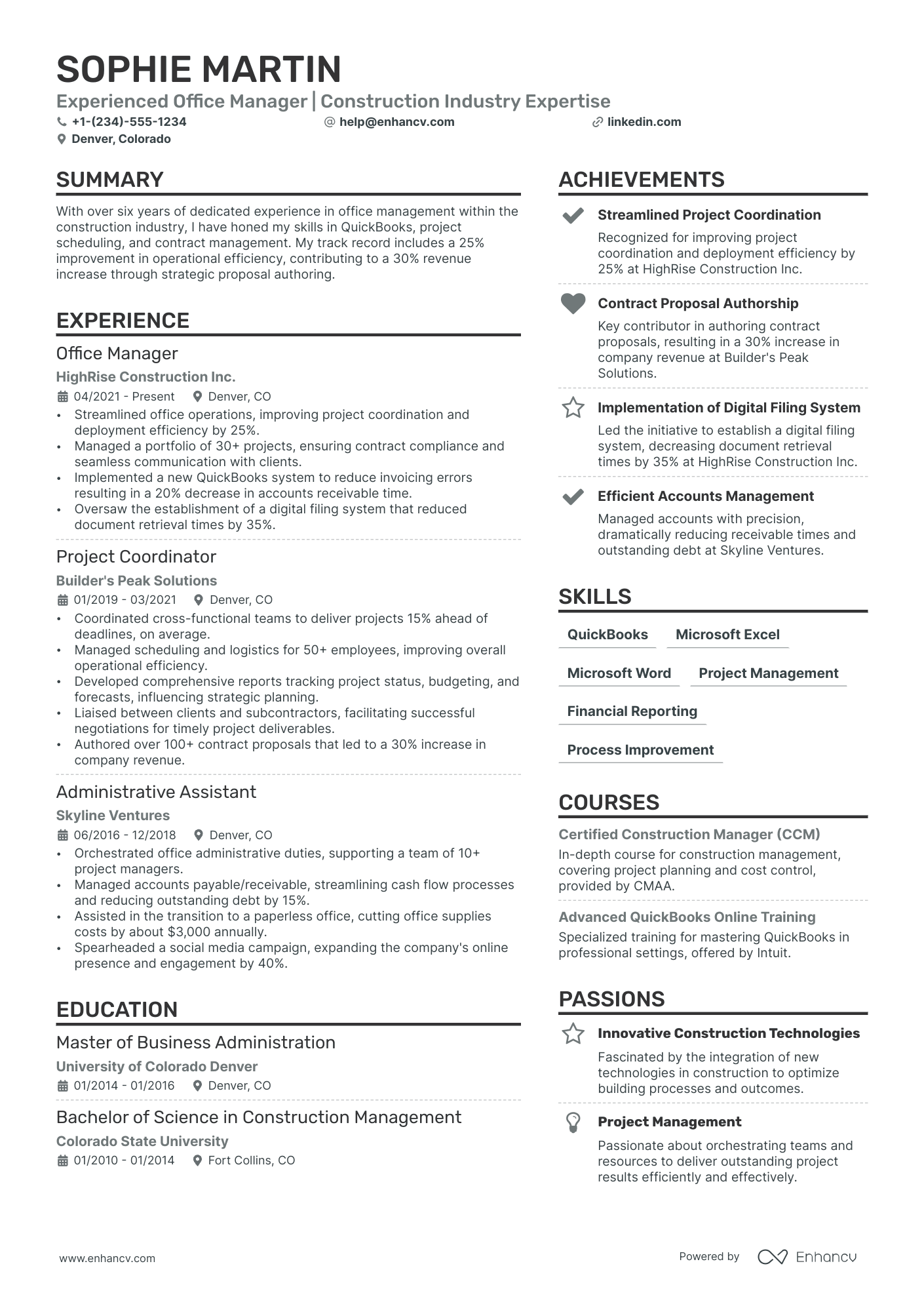Office management is a multifaceted job. It requires a myriad of skills, depending on the company. However, as an office manager, perhaps you've been underestimated once or twice. People often don't see the purpose of your job, or they don't understand what it entails. Some office managers give in to the frustration and lack the motivation to enhance their resumes. Don’t get stuck in that rut! Your job has unique value and importance, and you know best why that is!
Don’t expect that your line manager, the directors, or partners will know what you should be doing to protect them or the business either, they won’t! And they’ll be looking at you to advise them and bring on the best that you can in your remit.
Hana Gray, an office manager with 20 years of experience
You can bring much more to the table than some people expect. Never let anyone underestimate you and create an impressive office manager resume with our thorough guide!
- What makes an effective office manager resume—from format to font
- How to measure impact as an office manager
- Good and bad examples of an experience section—with a real job posting to refer to
- How to stand out if you’re an entry-level candidate
- The most useful certifications for office management
- When and how to list your major and minor in your resume
- Why a personal statement on your resume is crucial
- The additional sections for an office manager that just make sense
Check out these related resume guides:
- Office Assistant Resume
- Personal Assistant Resume
- Administrative Assistant Resume
- Secretary Resume
- Administrative Secretary Resume
- Executive Personal Assistant Resume
- Office Administrator Resume
- Front Desk Receptionist Resume
How to format an office manager resume
An effective resume for an office manager highlights relevant skills, experience, and achievements. Render your strengths in a clear, concise manner by choosing the right format. But which one is best? Well, it depends on your experience and your goals.
If you’ve already worked in office management, the reverse chronological resume is a great choice. It will put the focus on your experience and office manager achievements. If you’re just starting out, consider the functional resume. Put your best foot forward with your skills and accomplishments.
And if you believe your experience and skills are equally strong, consider the hybrid resume. It’s also especially useful if you’re switching careers.
Formatting tips to get you ahead
Here are a few more tips to help you format your office manager resume:
- Resume length: Aim for a 1-page structured resume. Don’t be shy of a 2-column format, as it is perfectly readable by ATS (Applicant Tracking Systems).
- Use space: The proper use of white space on your resume can increase readability and comprehension. The right font can also boost readability: choose a simple and elegant font like Lato, Arial or Calibri.
- Clear margins: Keep your margins at about 1 inch. Proper margins ensure the overall accessibility of your document. And, bonus, ATS scanners can easily process your 1-inch-margin resume.
- Colors on your resume: A little color on your resume can show your unique personality. It’s also a nice way to direct attention to your strong points.
- Stick to the point: Don’t fall into the trap of sharing too much personal information. Your resume is your business card, so steer clear of fluff.
- Header and photo: Perfecting your resume header is important, as it sets the tone for your application. Don’t forget to include a relevant job title and a professional email address. As for photos, it’s always best to check the company’s policy. While it can give your resume personality, a photo might be considered unprofessional.
- Spelling and grammar: Attention to detail is useful for an office manager. Prove it’s a quality you possess by keeping your resume typo-free. While a typo might not bar you from the application process, rely on technology to proofread your document.
Prepping for an interview? Our free ATS Resume Scanner will help you!
Consider the local standards – Canadian resumes, for example, may have a different format.
Is your resume good enough?
Drop your resume here or choose a file. PDF & DOCX only. Max 2MB file size.
Here are some essential sections to include in your office manager resume:
The top sections on an office manager resume:
- Personal information: It's necessary to include this so recruiters know your basic details such as name, contact details, and location.
- Objective statement: This gives a summary of your career goals and why you're suited for the office manager position.
- Work experience: Displays relevant experience you've had in past roles and the accomplishments achieved especially in administrative tasks.
- Skills and competencies: To highlight your managerial, administration, and communication abilities critical for the office manager job.
- Education and professional development: Outlines your educational background and any other training specific to office management.
Recruiters typically have specific criteria for resumes. Consider including the following:
What recruiters want to see on your resume:
Proven experience in office management: Recruiters look for this to make sure you have a background in handling administrative duties effectively.
Proficient in office software: This is an advantage because an office manager will spend a lot of their time using these tools for a wide variety of tasks.
Leadership skills: Since an office manager often manages other staff, recruiters will appreciate seeing this skill, to ensure a harmonious and efficient team.
Organizational abilities: A priority for recruiters since an office manager needs to handle a variety of tasks and keep the office running smoothly.
Excellent communication skills: Recruiters prioritize this to ensure effective and efficient communication within the office is maintained.
Your experience will probably take up the bulk of your resume. Keep reading to see how to make it count.
How to write your office manager resume experience
The experience section of your resume is arguably the most important. But it's also the section that people make the most mistakes in.
It might be tempting to use the bullet points to list your daily job responsibilities. But that's doing yourself a huge disservice. Recruiters know what an office manager does. They probably helped write the job description.
Instead, use this section to list your accomplishments and contributions to previous employers. That way, recruiters get a sense of what kind of value you can bring to their organization.
Let’s look at a real job posting and the right and wrong way to write an experience section for it.
Job Title: Office Manager
Company Introduction: Our company is a start-up developing ophthalmic therapeutics for cataract/lens replacement, glaucoma treatment, and other chronic ophthalmic diseases.
Founded by veteran, successful entrepreneurs, our team includes engineers, scientists, and clinicians with deep roots in pharmaceuticals, drug delivery, and medical devices. Our founders’ experience developing new devices, from inception to clinical application, spans 30+ years, 100 patents, and multiple products in clinical use worldwide.
Our commitment to actively improving patients’ quality of life drives the company to innovate and succeed.
Job Description: We are seeking an experienced Office Manager who will act as a key support figure for our leadership team while managing day-to-day office operations. Reporting directly to the Vice President of Human Resources, this role requires exceptional organizational skills, a proactive mindset, and the ability to handle a wide range of responsibilities effectively.
Duties & Responsibilities
- Manage office facilities, including maintenance, supplies, and equipment procurement.
- Coordinate office logistics, such as meetings, appointments, and travel arrangements.
- Provide executive assistance to the leadership team, including scheduling meetings, managing calendars, and handling correspondence.
- Assist in preparing and editing presentations, reports, and documents using Microsoft PowerPoint and other software tools.
- Coordinate travel arrangements, expenses, and logistics for executives and visitors.
- Manage office facilities, including supplies procurement, maintenance, and vendor relationships.
- Serve as a point of contact for internal and external stakeholders, handling inquiries and communications with professionalism and discretion.
- Assist in onboarding new employees and organizing employee events.
- Maintain confidentiality and handle sensitive information with utmost care.
- Collaborate with cross-functional teams to ensure seamless office operations and support various projects as required.
Qualifications:
- Bachelor's degree in business administration, office management, or related field preferred.
- Proven experience as an executive assistant or office manager with a focus on supporting senior leadership.
- Proficiency in Microsoft Office Suite, particularly PowerPoint, with strong presentation design skills.
- Excellent organizational, multitasking, and time management abilities.
- Strong communication and interpersonal skills with a professional demeanor.
- Ability to work independently, prioritize tasks, and adapt to changing priorities in a fast-paced environment.
Location: Aliso Viejo, California
Here’s an experience section that won’t impress recruiters:
- •Managed office tasks
- •Communicated with clients and colleagues
- •Performed data entry
- •Organized files and documents
Why doesn’t this entry grab recruiters’ attention?
- Lack of specificity: Vague descriptions like "Managed office tasks" and "Performed data entry" fail to highlight specific skills or achievements. This makes it hard for employers to estimate the candidate's capabilities.
- No quantifiable achievements: The bullets lack measurable outcomes. There's no mention of the volume of data entered, files organized, or the impact on company efficiency. This is a missed opportunity to showcase concrete successes.
- Generic language: Basic phrases like "Organized files and documents" don't set you apart. They also fail to show advanced skills or unique contributions.
Now let’s look at the same example, improved:
- •Managed office facilities, including maintenance, supplies, and equipment procurement.
- •Coordinated executive meetings, appointments, and travel arrangements.
- •Assisted in preparing and editing presentations, reports, and documents using Microsoft PowerPoint.
- •Handled correspondence and communication with internal and external stakeholders.
- •Organized employee events and assisted in onboarding new employees.
This one works because it includes:
- Relevant experience: Directly matches the responsibilities listed in the job posting.
- Detailed bullets: Provides specific tasks and office manager achievements that align with the role. This shows the candidate's ability to handle similar responsibilities.
- Professional language: Professional and concise language highlights key skills and qualifications sought by the employer.
Real-life examples are great because they give you concrete information. So does measurable impact on your resume.
How to quantify impact on your resume
In today's competitive job market, simply listing your job duties isn't enough. To truly stand out, you need to point out the impact you've made in your previous roles. These accomplishments prove your ability to enhance efficiency and boost productivity. That's how you contribute to the company's success. Here are some powerful ways to describe your quantifiable accomplishments as an office manager:
- Report any cost-saving measures implemented: This demonstrates you can manage an office budget effectively, which can have a direct impact on a company's bottom line.
- Detail any procedures you introduced that increased efficiency: Show your ability to recognize and improve administrative processes, contributing to business productivity.
- Share any quantifiable improvements in the organization or retrieval of office data or documents: This showcases you can handle document control which is pivotal in maintaining business orderliness.
- Include data on time saved due to the streamlining of administrative processes: This could indicate your potential to increase overall company efficiency and productivity.
- Indicate any rise in existing customer satisfaction level under your watch: This could pinpoint your ability to manage client relationships significantly, a crucial aspect for businesses.
- Document your involvement in successful project management: Emphasizing your role in any successful project completion shows you can handle complex tasks over time which ties into important business objectives.
- Highlight any growth stats in team performance under your management: This points to your team leadership skills, a crucial aspect of an office manager's role.
- Mention the changes you made that reduced office-related complaints or challenges: This underlines your problem-solving skills whilst maintaining a fruitful work environment, pivotal for staff productivity.
You can present your office manager's accomplishments in different ways. Just make sure you tailor them to the job description. Find the proper keywords and don’t include irrelevant information, unless you can make it fit your application.
Sometimes you’ve got solid examples to show off on your resume. And sometimes, you’ve got to make the most out of your skills and accomplishments. Here’s what to do if you’ve got little to no experience.
How do I write an office manager resume with no experience
If you’re just starting out, you’ll probably find entry-level jobs in office management across many fields. Almost every company needs an office manager, which makes it a versatile and valuable career path.
Being inexperienced can actually be a plus. It means you’re not weighed down by old habits or ways of thinking. Your mind is like a sponge, ready to soak up new knowledge and skills quickly. Use your adaptability and eagerness to learn to your advantage when applying for office manager jobs.
Here are a few tips on how to do it:
- Include any relevant education and training: Highlight any administrative courses or workshops you've attended to show your commitment to learning.
- Show experience with office software: Mention your proficiency with Microsoft Office Suite or project management tools like Trello or Asana. Provide examples of how you used these tools to increase productivity.
- Highlight administrative experience: Even part-time or college-related administrative tasks such as filing, drafting letters, answering calls, and minimal IT troubleshooting.
- Demonstrate multitasking abilities: Provide examples where you managed multiple assignments and prioritized effectively.
- Volunteer work: Highlight any volunteer positions that involved administrative duties, showing your commitment and relevant experience.
- Certifications: Include any certifications like Microsoft Office Specialist or Google Workspace to prove your technical proficiency.
- Internships: List any internships that provided you with office experience, emphasizing the tasks and responsibilities you handled.
- Adopt the 'skill-action-result' style: Clearly show how your skills led to positive outcomes, such as using software tools to enhance office efficiency.
Indeed, your skills bring results. Here’s some advice on what skills to include in your office manager resume.
Office manager resume skills
Known primarily for their people skills, office managers should combine soft and hard skills to be successful in their role.
Hard skills refer to industry-specific skills or software. For some office managers, for example, this could include something like QuickBooks expertise. QuickBooks is an accounting software designed to manage financial operations.
A soft skill, on the other hand, refers to interpersonal strengths. This could be something like emotional intelligence. Soft skills are best demonstrated through on-the-job examples.
Here’s a list of the best industry-targeted competencies you can include in your resume skill section:
Best hard skills for your office manager resume
- Microsoft Office Suite proficiency
- Data analysis
- QuickBooks expertise
- Project management
- Budgeting
- Scheduling and planning
- Inventory management
- Document control
- Database administration
- Compliance management
- Office equipment operation
- Human resources management
- Vendor management
- Customer relationship management (CRM)
- Enterprise Resource Planning (ERP) systems
- Knowledge of office management systems and procedures
- Records management
- Basic troubleshooting of office equipment
- Office space planning
- Financial reporting
Moving on to the soft skills section, here are some traits every office manager needs in their job:
Best soft skills for your office manager resume
- Leadership
- Problem solving
- Time management
- Active listening
- Emotional intelligence
- Multitasking
- Negotiation
- Teamwork
- Flexibility
- Conflict resolution
- Critical thinking
- Decision making
- Creativity
- Detail oriented
- Stress management
- Public speaking
- Initiative
- Adaptability
- Self-motivation
- Diplomacy
PRO TIP
If you simply list your soft skills, they don't mean much. Consider illustrating them with real-world examples. You can list “Implemented online alphabetical filing system that grouped files by project, tasks, and team member” (for Problem solving) or “Responsible for delegating tasks, implementing office procedures, and training new hires” (for Leadership).
How to list your certifications and education on your resume
Embarking on a career as an office manager opens a world of possibilities. The education you need can vary based on the industry and specific job responsibilities. A high school diploma could be enough for some positions. But a degree in business administration, management, or a related field can open up more opportunities.
Whether you're eyeing a role in healthcare, finance, or any other vibrant field, make sure your education section stands out. Here’s an example:
- •Dean’s List every semester.
- •Relevant coursework: Office Management, Business Communication, Organizational Behavior.
- •Completed an internship with XYZ Corporation, assisting in project coordination and office administration.
What makes this education section strong:
- Detailed and specific: It includes comprehensive details about the degree and institution. It also mentions a good GPA, which makes you competitive.
- Relevant coursework: It highlights coursework related to office management, demonstrating relevant knowledge.
- Practical experience: An internship proves hands-on experience, making the candidate more attractive to potential employers.
If you’re a recent graduate, you can put even more focus on your education by adding your major and minor. Especially if they’re relevant to office management. Here's a good example: a major in business administration and a minor in human resources. A blend of administrative, managerial, and technical skills makes you well-suited for a career in office management.
Even if you don’t have a formal education, you can still outshine the competition with relevant certifications and training. Sometimes, they can be even more beneficial than a college degree, as they provide practical experience and skills.
Here’s a list of the top certifications you need for an office manager:
Best certifications for your office manager resume
Your resume would be incomplete without a personal statement that outlines your goals. Let’s explore your options below.
How to write your office manager resume summary or objective
Hiring managers look, on average, at each resume for just six to seven seconds. They don't have time to read every resume in-depth. But they do have time to read your personal statement.
So you need to make a strong first impression. Here's how to do that.
Take your experience and goals into account—if you’re just starting out in your career, a resume objective is the ideal choice for you. This type of personal statement focuses on your skills and accomplishments. Which is helpful if you don’t have much practical experience. However, if you’ve worked as an office manager for some time, consider crafting a compelling resume summary. A summary is just what it sounds like, a comprehensive overview of your experience so far. You want to allow recruiters to quickly understand what your professional agenda is.
Here’s an example of a poorly written resume summary:
This summary section is pretty generic. It doesn't mention any achievements, and relies solely on buzzwords, which is not a good strategy.
Now let’s look at an improved office manager resume summary:
This one’s much more unique. A recruiter can quickly see how long you’ve worked in the field and what kind of things you can do. It also includes quantifiable metrics, which make your experience concrete.
Optimize your resume summary and objective for ATS
Drop your resume here or choose a file.
PDF & DOCX only. Max 2MB file size.
Additional sections for an office manager resume
Including additional sections in an office manager's resume can significantly enhance your application. These provide a more comprehensive view of your skills, experiences, and personality. Here are a few suggestions:
- Awards and achievements: Specific office manager accomplishments, like “Employee of Year” award, set you apart.
- Projects: Any significant projects you have managed or participated in showcase your project management skills and ability to drive initiatives.
- Professional affiliations: Include memberships in professional organizations related to office management or administration.
- Hobbies and interests: Creative, non-work related hobbies make you stand out. Here, you can mention anything from event planning (your sister’s wedding, for instance) to team sports (it’s a great way to socialize with coworkers).
- Volunteer experience: Mention volunteer work that has provided you with additional skills or experience relevant to the office manager role, such as fundraisers or community event organizing.
Professional development section on an office manager resume
An appealing custom section you can add to make your resume shine is “Professional Development”. It can include courses, workshops, seminars, and other training programs you've completed that are relevant to office management.
- •Completed advanced training in office management.
- •Learned effective communication and conflict resolution.
- •Developed proficiency in Microsoft Office Suite.
- •Gained knowledge in HR management and leadership.
- •Participated in workshops on leadership and management.
- •Learned strategies for team building and motivational leadership.
- •Enhanced decision-making and problem-solving skills.
- •Developed advanced communication skills.
This section is beneficial because it:
- Shows commitment to growth: Demonstrates your dedication to staying updated with industry trends and improving your skills, which is essential for managing an office effectively.
- Highlights relevant skills: Provides evidence of your proficiency in areas directly related to office management, such as leadership, time management, and software usage.
- Sets you apart: Such a section shows your proactive approach to professional development, indicating that you are not only capable but also eager to learn and adapt.
Adding a Professional Development section to your resume can greatly elevate your profile. It's a sign of dedication to continuous growth and shows your proactive efforts to stay at the forefront of your field.
Key takeaways
Being an office manager is sometimes considered easy, but you know the dedication and effort it requires. Ensure your resume captures the hard work and skills you bring to the role. Let’s review the steps:
- Optimal formatting: Ensure your office manager's resume is clear and easy to read with a professional format.
- Comprehensive skills section: Align your skills with the office manager job description, incorporating both organizational and interpersonal skills to demonstrate versatility.
- Education and certifications: Emphasize your formal education and any specialized training relevant to office management, even if the position only requires a high school diploma.
- Experience details: Use real-life examples to effectively detail your office management experience.
- Unique content: Enhance your application with additional, distinctive sections specific to office management.
- Job market readiness: Demonstrate a competitive edge in the office management field by focusing on your strong skill set.
Follow these guidelines to create an office manager resume that truly reflects the value you’re aware you’ve got!
Office Manager resume examples
By Experience
By Role

